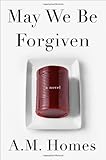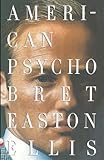 The suburban Dick and Jane characters of A.M. Homes’s oeuvre smoke crack, set their homes ablaze, lust for Barbie dolls, and teach teenage girls the art of perversion. In her new novel, the trend continues with a duplicitous protagonist whose actions take us straight to the divided heart of human consciousness.
The suburban Dick and Jane characters of A.M. Homes’s oeuvre smoke crack, set their homes ablaze, lust for Barbie dolls, and teach teenage girls the art of perversion. In her new novel, the trend continues with a duplicitous protagonist whose actions take us straight to the divided heart of human consciousness.
Spineless college professor and Nixon scholar Harold Silver is wearing his brother’s pants. He’s using his brother’s driver’s license, living in his brother’s home, and taking care of his brother’s kids. Younger taller brother George, a successful TV executive and the more charming, more mercurial half of the pair, has killed wife Jane after finding her in bed with brother Harry. Within the first few pages of the novel, Jane is dead and George has been exiled to The Lodge, an in-patient facility for wealthy murderers with good insurance, leaving Harry to pick up the pieces of his brother’s dramatically disaggregating life. A year later, Harry will reminisce on the night he stood pressed against Jane over the greasy carcass of a Thanksgiving turkey and he’ll ask the question that serves as the title of the book: “May We Be Forgiven?”
Wait. Rewind. May who be forgiven?
We’ll get to that, but first let’s talk about the plot. The twists and turns in May We Be Forgiven are classic A.M. Homes. At first glance, Harry is a bumbling everyday man who imagines himself, much like his unlikely hero Richard Nixon, an unassuming salt-of-the-earth kind of guy who just happens to find himself in one compromising situation after another. He stumbles onto his brother’s internet porn where people advertise their bare bits like a pride of lions on Mutual of Omaha’s Wild Kingdom. Then, as if there’s no other option, he drives across town for a real-time tryst with a woman who insists on paying for sex because she wants a man who can feel both the pleasure and the degradation. Later, we find Harry seeking redemption at a church meeting where, under the alias Nit, he divulges his darkest secrets to a group of people who respond by asking if he has a drinking problem (oops, wrong meeting). After several visits to The Lodge, things get even stranger when George is transferred to The Woodsman, a “low-cost survival-of-the-fittest penal colony” where micro-chipped prisoners police themselves under constant satellite surveillance, also Wild Kingdom-style.
Somewhere amidst murder, kinky sex, and Harry’s budding relationships with a collection of random strangers, is a nested story about impeached President Richard Nixon. Homes’s satire on the troubled history of the American Presidency not only adds a layer of complexity to Harry’s character, it also raises questions about our ignorance of American institutions of government. But, as with the rest of the novel, she administers this medicine with a dose of scintillating humor. For instance, in Harry’s theory of Presidential politics, there are two types of Presidents: one type has a lot of sex and the other type starts wars. In short, says Harry, and “don’t quote me because this is an incomplete expression of a more complex premise — I believe blow jobs prevent wars.”
One can certainly follow the advice of the dust jacket and read the novel as a darkly comic tale about a family reinventing itself after a series of blunders and tragedies. But wouldn’t it be more fun to pay attention to the book’s duplicity, its cornucopia of references to history, culture and authors like John Cheever, who appears in the novel as an apparition, and Robert Louis Stevenson, who shows up indirectly when George tells Harry to mind the black spot on his Gertrude Jekyll roses? Wouldn’t it be more interesting, in other words, to read Harry as a man who doesn’t know he’s gone mad and whose brother George, like the ghost of Cheever, is also an apparition? Scenes where Harry asks George if “we screw[ed]…the neighbor lady” leave the impression that there’s more going on here than pathologically blurred boundaries. Similarly, when Harry looks in the mirror and watches his face divide and fall in half, when he considers himself as much a murderer as George, and asks himself why he’s out of context as if he doesn’t really exist, we feel a sense of vertigo.
This does beg the question, who is the “we” asking to be forgiven in the opening paragraph of the novel? Certainly readers will find in Harry echoes of the adulterer, John the Baptist, praying for us all to be forgiven our sins. Homes repeatedly plays upon religious irony, including one of my favorite scenes at a Yom Kippur service in which Harry joyously proclaims, “I am guilty. I am guilty of even more than I realized I could be guilty of…,” while a rabbi recites a litany of familiar sins. Beneath the surface, Harry never really connects his guilt with his actions. He’s a multifaceted character who projects everything dark and desirous onto a brother he can’t distinguish from himself, suggesting that the “we” is a beastly side of Harry, personified in George. But this remains an open question because Homes is a novelist who immerses readers in the world of her characters and keeps them there from beginning to end. May We Be Forgiven is a novel that never breaks that pact.

 This, friends, is the crowning achievement of the novel. As unreliable narrators go, Homes’s fraternal doppelgänger outdoes both that of Bret Easton Ellis’s American Psycho and the unnamed insomniac putz who fights with his alter-ego in Chuck Palahniuk’s Fight Club. The difference is that there’s a certain rationality in the two wildly popular precursors, which allows the reader to sit back and watch the character’s insanity unfold. James Wood calls this kind of narration “reliably unreliable.” Referencing seminal examples of unreliable first-person narration like Charlotte Brontë’s Jane Eyre and Nabokov’s Lolita, Wood argues that these novels teach us how to read the character’s instability because their authors alert us to it and show us how to plug the holes.
This, friends, is the crowning achievement of the novel. As unreliable narrators go, Homes’s fraternal doppelgänger outdoes both that of Bret Easton Ellis’s American Psycho and the unnamed insomniac putz who fights with his alter-ego in Chuck Palahniuk’s Fight Club. The difference is that there’s a certain rationality in the two wildly popular precursors, which allows the reader to sit back and watch the character’s insanity unfold. James Wood calls this kind of narration “reliably unreliable.” Referencing seminal examples of unreliable first-person narration like Charlotte Brontë’s Jane Eyre and Nabokov’s Lolita, Wood argues that these novels teach us how to read the character’s instability because their authors alert us to it and show us how to plug the holes.
 In May We Be Forgiven, the reader doesn’t have the luxury of distance. From page one, she is inside Harry’s head, inside his body, feeling his dizzying confusion, perhaps even hallucinating up a whole makeshift family, unable to distinguish reality from a dream in one moment and just a regular guy in the next. This places Harry Silver in the far more rare category of “unreliably unreliable” narrators, a category populated by only a handful of novels, most notably the underground man of Dostoyevsky’s Notes from the Underground.
In May We Be Forgiven, the reader doesn’t have the luxury of distance. From page one, she is inside Harry’s head, inside his body, feeling his dizzying confusion, perhaps even hallucinating up a whole makeshift family, unable to distinguish reality from a dream in one moment and just a regular guy in the next. This places Harry Silver in the far more rare category of “unreliably unreliable” narrators, a category populated by only a handful of novels, most notably the underground man of Dostoyevsky’s Notes from the Underground.
David Foster Wallace said that good fiction’s job is to comfort the disturbed and disturb the comfortable. This book may not be the first choice for those who want to be comfortable. Its point of view is unsettling, even outright disturbing. At times, I felt like I was sitting on the weighted bob of Foucault’s pendulum (also noted in the book), the background shifting constantly and characters appear and disappear as the pendulum swings from one context to the next. Other times, I felt as though I was inside an Escher piece, from one angle viewing a perfect portrait of a mad man; from another, a world that looked frighteningly familiar, Harry’s madness a symptom of the fragmented, dissociated, techno-happy culture we live in.
While Homes’s tragicomedy may trouble some readers, it meets and far exceeds Wallace’s criteria for good fiction. For readers like me who choose Homes’s work because it reminds us to be courageous and shows us how to do it, May We Be Forgiven does not disappoint: it gives us a rare journey inside the divided heart of human consciousness, not a brief visit from a safe distance.
A.M. Homes remains the most daring voice of her generation and May We Be Forgiven is her magnum opus.





